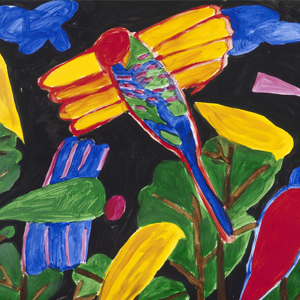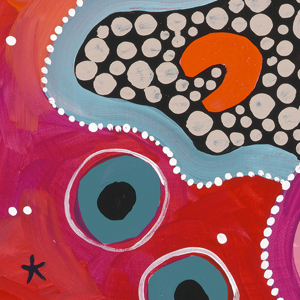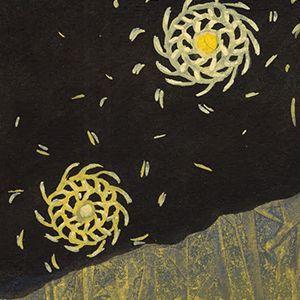
PURSUING VIRTUE
Putting Purpose in its Place
Jesse S. Summers
Artwork: “Crescendo” by Mandy Budan © 2013
My grandfather wrote music for as long as I can remember, though I only ever heard one of his songs, at a Christmas program in grade school. After he died, my musician uncle looked through what, to my young mind, seemed like an entire room of his music and said that it wasn’t particularly good. He didn’t say it with criticism or sadness that this was how his father had used his one and only life, writing music that no one would hear, and that the world didn’t need anyway. It was just a fact. Most music isn’t anything special, and this was like most music.
I was about to graduate college when he died, and in my mind, my life’s trajectory was still going to lead to recognizable success, probably even some prestige. I wasn’t going to be president (unless the public clamored for it, of course, but even then only reluctantly), but no one would someday reflect back on my one and only life and find it lacking recognizable achievements; whatever papers I left behind would be worth looking through. Those achievements would ensure my life would not be without meaning.
“What is the meaning of life?” is a philosophical question if any is, but while getting the philosophy degree I was graduating with—and in the two and a half decades of philosophy classes that followed—I have never had to ask or answer that question. I suspect I have avoided the question because I already read philosophy books with self-help-like titles that make me feel self-conscious in public: In Praise of Failure, Idleness, and Know Thyself, to pick titles from only this past summer. Philosophers—or at least I—feel that we’re not distinct enough from the fields we’re next to in the bookstore: Self-Help, Metaphysics, Religion. If we start asking “What does it all mean?”, then is there a difference? (And why insist on a difference? Psychology is also nearby).
The philosopher Susan Wolf is an exception, and probably too self-assured to care where her book, Meaning in Life and Why it Matters, is shelved. Her decidedly philosophical account is that meaning is found “in loving objects worthy of love and engaging with them in a positive way.” Her view seems right, at least for bourgeois meaning: a life writing and reflecting on great literature is meaningful, and a life watching grass grow is not. But what about the dilettante and the flâneur? Some of us do what we’re bad at, won’t improve much, and posthumous success will not be the machina, ex which any meaning will be discovered. Can her account find meaning in my grandfather’s life of writing what no one will see or hear, or my own of doing the same?
The reason even to ask the question is that, when someone looks for meaning in life, their search switches almost immediately to achievements, to life’s purpose. We ask what the point is of all of this self-indulgent writing. In fact, in one of the very first instances of the phrase “meaning of life,” in Schopenhauer’s 1897 On Human Nature, he immediately follows “What is the meaning of life at all?” with “To what purpose is it played, this farce in which everything that is essential is irrevocably fixed and determined?” (Possibly the first use of “what is the meaning of life?” is immediately followed by “as if there could even be one”: Schopenhauer’s gonna Schopenhauer).
Meaning and purpose are related, but not synonyms. Purpose has something to do with goals, results, ends, functions; meaning has something to do with how things fit together in larger systems or patterns. Now, one way that things fit together in a pattern or system is for each of them to be a part of a whole, where that whole is unified precisely by having some function or purpose. So having a purpose is one way to find or make meaning. The hairspring finds its meaning within a watch because its purpose is to provide power to the whole mechanism; its meaning is different if placed in a museum display about the history of miniaturization.
But finding a purpose is not the only way to find meaning. Which is probably good, because purposes are risky when we move from asking about the purpose of a hairspring to asking about the purpose of a human. Supposed human purposes have justified almost every historical tragedy, large and small: genocides, torture, expulsions, wars. An idle person will disappoint Kant by not developing their innate talents, but slackers don’t incite genocides.
This isn’t a coincidence. The upshot of finding a purpose is to find justifications and motivations to do what you otherwise wouldn’t, to find commitment where you would otherwise have doubt; and, while no one reading this will sponsor a genocide, every bad action has had at least some justification for it, which a history of Great Men doing Great Things will readily demonstrate. Working toward a grand human purpose makes it easier to find those justifications and dismiss conflicting ones. The bigger the purpose, the bigger the justification, and a purpose-driven life drives roughshod over competing interests.
If we want our lives to be meaningful, though, is there an alternative to finding our purpose? There is, which will be easier to see after wondering if the near synonymity of the two terms is itself a historical anomaly.
The frequency of the terms “meaning” and “purpose” in published books moved in lockstep until the mid–18th century, but then the use of “purpose” escalated rapidly and stayed elevated until the 20th century. Not to overread limited data, but there’s an obvious hypothesis for this change. The Industrial Revolution changed far more than what we thought steam could do. It also gave us a watch-like model to understand people and things functioning together, from machines to nations’ comparative advantages.
In such a context, a person—like the machines they worked alongside—is whatever their role, their function, their purpose is in the larger whole. And if a growing percentage of the people in society work in roles with clear purposes every day, how could they not come to understand everything and everyone as purpose-guided? The world looks like Tetris to me after half an hour playing that game, so what would it look like after a 16-hour shift in the factory?
Of course, the Industrial Revolution didn’t invent means-end reasoning or pursuing goals, both of which are much older than Homo sapiens, and such hypothetical imperatives are the core of pursuing purpose. Further, cooperation and specialization are inextricable from human civilization, so understanding ourselves as having a purpose did not arise with the spinning jenny. But social conditions shape our self-understanding, and it would be surprising if people didn’t come to see themselves and everyone else on the model of a factory-wide, village-wide, society-wide, even history-wide or universe-wide machine.
Whatever historical change happened might be as difficult for us to reconstruct here and now as it will be for future generations to understand the simple, quiet chaos and independence of our pre-internet, pre-cell-phone lives. As Alastair McIntyre has famously explored, Aristotle’s telos and ergon are certainly not the “purpose” and “function” of our own conceptual repertoire. But, whatever the validity of my historical hypothesis, we’ve cleared a path to find meaning without purpose.
We search for meaning more often in a dictionary than in a life. How a word or a sentence comes to have meaning is, to exaggerate only slightly, the primary topic of late-19th to 20th century Anglo-American philosophy. The philosopher Charles Dodgson (with Lewis Caroll’s plume in Through the Looking-Glass [1871]) can explain, in his distinctive way, one philosophical point of agreement about meaning:
“But,” Alice objected, “‘glory’ doesn’t mean ‘a nice knockdown argument.’”
“When I use a word,” Humpty-Dumpty said in rather a scornful tone, “it means just what I choose it to mean—neither more nor less.”
“The question is,” said Alice, “whether you can make words mean so many different things.”
“The question is,” said Humpty-Dumpty, “which is to be master—that’s all.”
As we’re supposed to realize, contra Humpty-Dumpty, words’ meanings are not only the speaker’s intentions but are found within larger patterns of language and life: patterns of use, of sense, of definitions, of something more than the person’s own mind.
By analogy, the meaning of a life—from the person leading it to the actions and events within it—doesn’t come from what you privately want it to be. I don’t become a writer by sitting in cafes with a moleskine notebook, and my intention to borrow, not steal, a book is irrelevant if the shelf I’m taking it from is in a bookstore. More dramatically, whether one is a traitor or a revolutionary is almost entirely up to history.
For something to be meaningful is for it to have a recognizable place in one of those larger patterns. “Meaningful” isn’t “good,” though: borrowing and stealing are both meaningful, as are treasons and revolutions. By contrast, lying on the ground watching grass grow isn’t meaningful because it fits into no obvious patterns. But even watching grass grow isn’t as far from being meaningful as it might seem: countless suburban dads find watching grass grow to fit their social lives, and we shouldn’t be too quick to dismiss where to find patterns of meaning.
Now, we might want meaningful lives, but what we really want is for our actions and our lives to matter, to be important. (Meaning in Life and Why it Matters, remember?) This is where purpose swoops in to make things easy. A recognizable, life-defining purpose both organizes your actions into a pattern and shows how that entire pattern matters.
Monitoring one’s suburban lawn is meaningful in a way that lying on the ground watching the grass is not, but neither obviously matter. (You, like my neighbors, might disagree). But if your purpose is to prepare a nice lawn for the outfield of the World Series, or as the only outdoor play space for local refugee children? This is why “finding your purpose,” by unifying disparate actions into patterns and explaining why the patterns matter, is a cure-all to a life that seems to lack both meaning and mattering.
So what’s the alternative to finding your purpose? The alternative is in meaningful patterns that are not purpose-driven but still matter: being friends, playing games, being nice, being generous, loving one’s family, having hobbies, knowing oneself, being happy, contemplating God. If we insist on finding a purpose for everything, we can find purposes for the items in that list, too, but we’re overreading those patterns if we do. They’re meaningful and matter even without any larger purpose; the further consequences of those patterns are not (and often should not be) the purpose of doing them. You shouldn’t sustain friendships in order to live a longer life, even if the research says people with more friends live longer; and the purpose of a vacation needn’t be to “recharge” for more productive work. Enjoying life matters.
I don’t want to insist on a false dichotomy. Purposes in life are also good. Achievements have their own value. It’s no coincidence that society has arranged itself in such a way that people find their purposes in ways that make it easy for us to get good food and enjoy air conditioning, and it feels good to contribute to society, even if only on the margins. But civilization doesn’t need everyone to find a calling and live with passion. Many are called, but few are the job openings, and you don’t need to feel a lack if you’re not one of the elect. The rest of us can live ethically, help where needed, and appreciate non-instrumental leisure, friendship, and play. We needn’t find purpose in order to find life meaningful.
But do our purpose-less lives matter? Does writing little ditties, musical or philosophical, matter? Maybe; because, unlike meaning, what matters can be determined entirely by what’s in someone’s head: something matters because it matters to me. Or maybe not; maybe watching grass grow and writing down one’s philosophical thoughts simply doesn’t matter, no matter what anyone thinks.
But maybe what is meaningful in a life of writing ditties that don’t matter isn’t the ditties, it’s the writing of them. Writing is a way of expressing one’s creativity or intellect, even if the creativity and intellect are weak or go forever unrecognized. Creative human expression in those patterns is meaningful, and humans’ expressing their creativity and intellect also matters. Not, as Kant would have it, because we’re developing those faculties, though that might be true, but because those meaningful, purposeless patterns are themselves constitutive of a worthwhile life. We see that more clearly if we ask not what a life is for, but, instead, how to love the worthiness of what we do.

Jesse S. Summers is Director of University Initiatives for the Purpose Project at Duke University and a senior fellow at the Kenan Institute for Ethics.
Spring 2024
Part I: Pursuing Virtue
L. Gregory Jones
Sabrina B. Little
Kelli Reagan Hickey
Jesse S. Summers
Interlude: Purposeful Pursuits
Howard Gardner
Part II: Pursuing Vocation
Clayton Spencer
James Coleman, Jr.
James and Margaret Plews-Ogan
Carolyn Woo
MORE

















